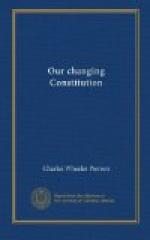with the Constitution. In the action brought to
test the question[1] it appeared that the income on
which Mr. Springer had been taxed was derived in part
from the practice of his profession as an attorney.
To this extent it was clearly an excise or duty,
i.e.,
an indirect tax. As it was incumbent upon Mr.
Springer, by reason of the form of the action, to
demonstrate that the tax was void
in toto the
Court could not do otherwise than decide against him.
In rendering its decision, however, the Court took
occasion to discuss the question as to what were direct
taxes within the meaning of the Constitution, and expressed
the view that the term included only capitation or
poll taxes, and taxes on real estate. There the
matter rested until the year 1894 when Congress enacted
another income tax law. This time the argument
from necessity was lacking. The country was in
a state of profound peace. Opposition to the
tax among the moneyed interests was widespread.
Test suits were brought and after most elaborate and
exhaustive argument and reargument the Hylton and
Springer cases were distinguished and the act was held
unconstitutional.[2] The decision was by a closely
divided Court (five to four), the majority finally
holding that “direct taxes” within the
meaning of the Constitution included taxes on personal
property and the income of personal property, as well
as taxes on real estate and the rents or income of
real estate. This conclusion was fatal to the
act. It was conceded that the tax, in so far
as it affected income derived from a business or profession,
was an indirect tax and therefore valid without apportionment
among the states, but the provisions for taxing the
income of real and personal property were held to be
an essential part of the taxing scheme invalidating
the whole statute.
[Footnote 1: Springer v. United States,
102 U.S., 586.]
[Footnote 2: Pollock v. Farmers Loan
& Trust Co., 157 U.S., 429; same case on rehearing,
158 U.S., 601.]
This momentous decision was almost as unpopular with
Congress and the general public as the decision in
Chisholm v. Georgia had been a hundred
years earlier. Many legislators were in favor
of enacting another income tax law forthwith and endeavoring
to coerce the Court, through the force of legislative
and popular opinion, to overrule its decision.
Calmer counsels prevailed, however, and plans were
initiated to get over the difficulty by a constitutional
amendment. Meanwhile, steps were taken to eke
out the national revenue by various excise taxes,
notably the so-called Federal Corporation Tax.
This novel tax, which was thought by many to involve
a very serious encroachment by the Federal Government
on the powers of the states, will be discussed more
at length in later chapters.[1]
[Footnote 1: See Chapters X and XI, infra.]
The constitutional amendment as proposed by Congress
and ratified by the states provided:




